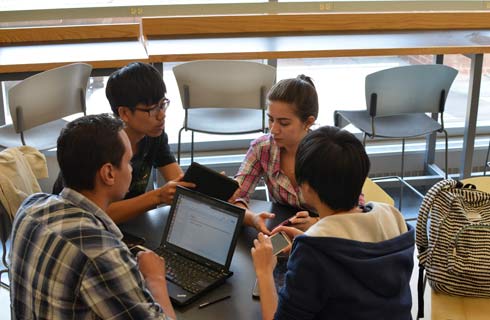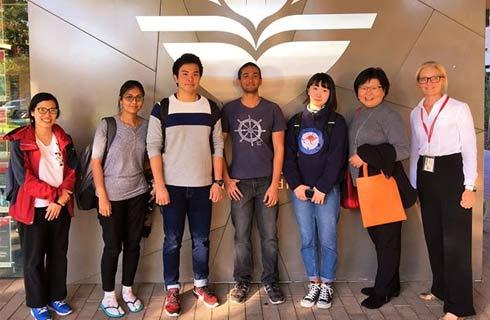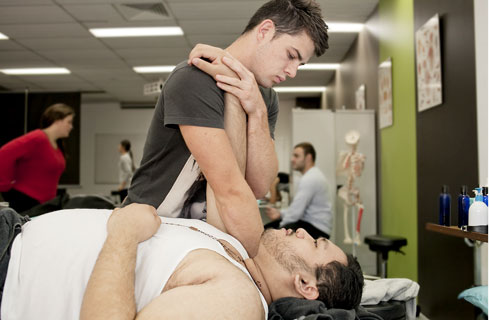国际学生入学条件
Eligible applicants must hold a master’s degree in nursing or a related field (i.e. MPH, MBA, MHA) and a current license to practice as a registered nurse or advanced practice nurse or certified nurse midwife in the United States. (Connecticut licensure is not required.) If the applicant’s Bachelor’s of Science degree is not in nursing, the master’s degree MUST be in nursing.
English Language requirements: The minimum score on the TOEFL is 610 on the paper-based test or 102 on the Internet-based test.
IDP—雅思考试联合主办方

雅思考试总分
6.0
- 雅思总分:6
- 托福网考总分:60
- 托福笔试总分:160
- 其他语言考试:NA
CRICOS代码:
申请截止日期: 请与IDP联系 以获取详细信息。
课程简介
The ultimate Mission of the Yale School of Nursing is better health for all people. We accomplish this by educating each generation of nurse leaders, scholars and practitioners, transforming healthcare practice, and advancing science. Building on the tradition of our Founding Dean, Annie W. Goodrich, the YSN community relates the adventure of thought to the adventure of action, in touch with the fundamentals of human experience1 across local, national and international systems of care. Fields include chronic illness (diabetes, cardiovascular disease, cancer, HIV/AIDS), self- and family management, maternal and child health, sleep and sleep disorders, global health, health equity and care of vulnerable populations, acute and critical care, end-of-life and palliative care, genetic and environmental influences on health, gerontology and long-term care, and school- and community-based interventions.
相关申请
 预科
预科 奖学金
奖学金 实习机会
实习机会 在校学习
在校学习 跨境学习
跨境学习 校园授课-线上开始
校园授课-线上开始 在线/远程学习
在线/远程学习
开学时间&学费
学费信息仅供参考,请与IDP联系以获取详细信息
| 开学时间 | 时长 | 学费 | 地点 |
|---|
学校排名

世界排名8
数据源:
泰晤士高等教育世界大学排名
关于耶鲁大学

常年全美,甚至世界前三的排名对于这所已经300多岁的大学来说早已是过眼浮云。美国建校最早的三所大学中,哈佛大学注重和闻名于研究生教育,威廉玛丽学院闻名于本科生教育,只有耶鲁是研究与本科文理并重。在学生眼里:耶鲁就是没有竞争,没有臭架子,不用想着处处都要胜人一筹的“哈佛”。时至今日,耶鲁已泰然走进自己的第四个百年,其追求的目标也早已不局限于教育本土年轻人,而是为全世界培养优秀的人才。招收国际生的历史在耶鲁已经持续了将近200年,国际化的教学议题也已融入各个专业的教学大纲超百年。这不仅仅使得教学的深度与广度得以最大限度的延伸和扩张,更让合格的耶鲁毕业生能够在全世界任何角落完美展现自己的能力。耶鲁的录取政策对有不同宗教信仰的学生一视同仁,最最重要的是你的个人风格。每年众多的申请者中,只有不到20%的人SAT单项低于700分。相信这20%的人中有相当一部分成为了耶鲁7%录取率背后的牺牲品。不过但凡你被录取,那么你至少有50%的几率拿到奖学金!!
本校相关课程

西班牙语和葡萄牙语哲学博士
学历文凭
Ph.D.
开学日期
课程费用总额


社会学哲学博士
学历文凭
Ph.D.
开学日期
课程费用总额


俄罗斯文学与文化哲学博士
学历文凭
Ph.D.
开学日期
课程费用总额


文艺复兴研究哲学博士
学历文凭
Ph.D.
开学日期
课程费用总额


心理学哲学博士
学历文凭
Ph.D.
开学日期
课程费用总额


政治学哲学博士
学历文凭
Ph.D.
开学日期
课程费用总额

其他相关课程

护理科学学士学位
 圣弗朗西斯泽维尔大学
圣弗朗西斯泽维尔大学学历文凭
Bachelor Degree
开学日期
课程费用总额


护理哲学博士
 达尔豪斯大学
达尔豪斯大学学历文凭
Ph.D.
开学日期
课程费用总额


护理学硕士
 达尔豪斯大学
达尔豪斯大学学历文凭
Masters Degree
开学日期
课程费用总额


护理科学学士学位
 达尔豪斯大学
达尔豪斯大学学历文凭
Bachelor Degree
开学日期
课程费用总额


护理科学学士学位
 特伦特大学
特伦特大学学历文凭
Bachelor Degree
开学日期
课程费用总额


护理科学学士学位
 爱德华王子岛大学
爱德华王子岛大学学历文凭
Bachelor Degree
开学日期
课程费用总额










 美国
美国




